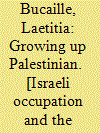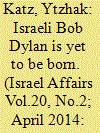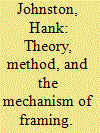| Srl | Item |
| 1 |
ID:
054275


|
|
|
|
|
| Publication |
Princeton, Princeton University Press, 2004.
|
| Description |
xxi, 168p.hbk
|
| Series |
Princeton Studies in Muslim Politics
|
| Standard Number |
0691116709
|
|
|
|
|
|
|
|
|
|
|
|
Copies: C:1/I:0,R:0,Q:0
Circulation
| Accession# | Call# | Current Location | Status | Policy | Location |
| 048759 | 956.953044/BUC 048759 | Main | On Shelf | General | |
|
|
|
|
| 2 |
ID:
131873


|
|
|
|
|
| Publication |
2014.
|
| Summary/Abstract |
This article examines the protest movement of the younger generation of Israeli songwriters and performers that emerged in response to the vicissitudes of the Arab-Israeli conflict over the past decades, notably the 1982 Lebanon war, the outbreak of the Palestinian intifada (December 1987), and Israel's unilateral disengagement from Gaza (2005). It argues that while this movement succeeded in inserting itself into the cultural and public arenas and shaking some of the unwavering beliefs and convictions held by the 'founding generation', its overall impact has remained limited.
|
|
|
|
|
|
|
|
|
|
|
|
|
|
|
|
| 3 |
ID:
144456


|
|
|
|
|
| Summary/Abstract |
This article bridges two literatures: research on social movements, in which framing is widely recognized as an important causal mechanism; and research in civil wars and insurgencies, which tends to deemphasize cultural-interpretative factors such as framing. We argue that it is important that insights of framing be applied to insurgencies because there is a fundamental framing action that often occurs. We have in mind civil wars in which oppositional activists, who previously had pursued nonviolent tactics, apply a prognostic frame of ‘what to do’ that specifies armed conflict. Drawing on methodologies of subject–verb–object grammars used to analyze political texts, this article elaborates a comprehensive approach to framing that involves not only shifts in the < verb>, or specifications of ‘what to do’, but also shifts in a < subject>, or definitions of ‘who we are’, and in an < object>, or the targets of ‘who the enemy is’. We use organizational texts from the first Palestinian Intifada to demonstrate the approach. We also consider frame shifts in the Syrian civil war, inferring the grammatical structures of the frame transformations for secularists and radical Islamists from events leading up to the outbreak of sustained violence. This article proposes that a three-part grammatical approach captures the interrelated elements of a full and robust framing mechanism that is generalizable. It represents an advance over framing perspectives that typically isolate identity and target components from action prognoses, therefore missing the synchronization among the three, and how limits and/or opportunities for one shape the definition of the others.
|
|
|
|
|
|
|
|
|
|
|
|
|
|
|
|